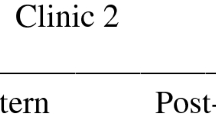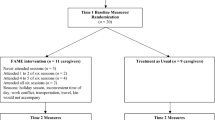Abstract
This paper reports on the 6-month follow-up outcomes of an effectiveness study testing a multiple family group (MFG) intervention for clinic-referred youth (aged 7–11) with disruptive behavior disorders (DBDs) and their families in socioeconomically disadvantaged families compared to services-as-usual (SAU) using a block comparison design. The settings were urban community-based outpatient mental health agencies. Clinic-based providers and family partner advocates facilitated the MFG intervention. Parent-report measures targeting child behavior, social skills, and impairment across functional domains (i.e., relationships with peers, parents, siblings, and academic progress) were assessed across four timepoints (baseline, mid-test, post-test, and 6-month follow-up) using mixed effects regression modeling. Compared to SAU participants, MFG participants reported significant improvement at 6-month follow-up in child behavior, impact of behavior on relationship with peers, and overall impairment/need for services. Findings indicate that MFG may provide longer-term benefits for youth with DBDs and their families in community-based settings. Implications within the context of a transforming healthcare system are discussed.

Similar content being viewed by others
References
Alvidrez, J. (1999). Ethnic variations in mental health attitudes and service use among low-income African American, Latina, and European American young women. Community Mental Health Journal, 35(6), 515–530.
American Psychiatric Association. (2000). Diagnostic and statistical manual of mental disorders—Text revision (4th ed.). Washington, DC: American Psychiatric Association.
Angold, A., Costello, J. E., Burns, B. J., Erkanli, A., & Farmer, E. M. Z. (2000). Effectiveness of nonresidential specialty mental health services for children and adolescents in the “Real World”. Journal of the American Academy of Child and Adolescent Psychiatry, 39(2), 154–160.
Appleyard, K., Egeland, B., van Dulmen, M. H. M., & Sroufe, L. A. (2005). When more is not better: The role of cumulative risk in child behavior outcomes. Journal of Child Psychology and Psychiatry, 46(3), 235–245.
Axberg, U., & Broberg, A. G. (2012). Evaluation of "the incredible years" in sweden: The transferability of an american parent-training program to sweden. Scandinavian Journal of Psychology, 53(3), 224–232.
Barrio, C. (2000). The cultural relevance of community support programs. Psychiatric Services, 51(7), 879–884.
Behan, J., Fitzpatrick, C., Sharry, J., Carr, A., & Waldron, B. (2001). Evaluation of the parenting plus programme. The Irish Journal of Psychology, 22(3–4), 238–256.
Boyd-Franklin, N. (1995). Therapy with African American inner-city families. In R. H. Mikesell, D. D. Lusterman, & S. H. McDaniel (Eds.), Integrating family therapy: Handbook of family psychology and systems theory (pp. 357–371). Washington, DC: American Psychological Association.
Chacko, A., Gopalan, G., Franco, L. M., Dean-Assael, K. M., Jackson, J. M., Marcus, S., & McKay M. M. (in press). Multiple family group service model for children with disruptive behavior disorders: Child outcomes at post-treatment. Journal of Emotional and Behavioral Disorders.
Chacko, A., Wymbs, B. T., Arnold, F. W., & O’Connor, B. (2009). Enhancing traditional behavioral parent training for single-mothers of children with ADHD. Journal of Clinical Child and Adolescent Psychology, 38, 206–218.
Chorpita, B. F., & Daleiden, E. L. (2009). Mapping evidence-based treatments for children and adolescents: Application of the distillation and matching model to 615 treatments from 322 randomized trials. Journal of Consulting and Clinical Psychology, 77(3), 566–579.
Collins, L. M., Murphy, S. A., & Bierman, K. L. (2004). A conceptual framework for adaptive preventive interventions. Prevention Science, 5(3), 185–196.
Collins, L., Murphy, S., & Stetcher, V. (2007). The multiphase optimization strategy (MOST) and sequential multiple assignment randomization trial (SMART): New methods for more potent eHealth interventions. American Journal of Preventive Medicine, 32(5s), S112–S118.
Costin, J., & Chambers, S. M. (2007). Parent management training as a treatment for children with oppositional defiant disorder referred to a mental health clinic. Clinical Child Psychology and Psychiatry, 12, 511–524.
Dumville, J. C., Hahn, S., Miles, J. N. V., & Torgerson, D. J. (2006). The use of unequal randomization ratios in clinical trials: A review. Contemporary Clinical Trials, 27, 1–12.
Eyberg, S., Nelson, M., & Boggs, S. (2008). Evidence-based psychosocial treatments for children and adolescents with disruptive behavior. Journal of Clinical Child and Adolescent Psychology, 37(1), 215–237.
Fabiano, G. A., Pelham, W. E. J., Waschbusch, D. A., & BurrowsMacLean, L. (2006). A practical measure of impairment: Psychometric properties of the impairment rating scale in samples of children with attention deficit hyperactivity disorder and two school-based samples. Journal of Clinical Child and Adolescent Psychology, 35(3), 369–385.
Gardner, F., Burton, J., & Klimes, I. (2006). Randomised controlled trial of a parenting intervention in the voluntary sector for reducing child conduct problems: Outcomes and mechanisms for change. Journal of Child Psychology and Psychiatry, 47(11), 1123–1132.
Goodwin, P. J., Leszcz, M., Ennis, M., Koopmans, J., Vincent, L., Guther, H., & Hunter, J. (2001). The effect of group psychosocial support on survival in metastatic breast cancer. New England Journal of Medicine, 345(24), 1719–1726.
Gopalan, G., Goldstein, L., Klingenstein, K., Sicher, C., Blake, C., & McKay, M. M. (2010). Engaging families into child mental health treatment: Updates and special considerations. Journal of the Canadian Academy of Child and Adolescent Psychiatry, 19(3), 182–196.
Gresham, F. M., & Elliott, S. N. (1990). Social skills rating system: Manual. Circle Pines, MN: American Guidance Service.
Hagen, K. A., Ogden, T., & Bjornebekk, G. (2011). Treatment outcomes and mediators of parent management training: A one-year follow-up of children with conduct problems. Journal of Clinical Child and Adolescent Psychology, 40(2), 165–178.
Hautmann, C., Stein, P., Hanisch, C., Eichelberger, I., Pluck, J., Walter, D., & Dopfner, M. (2009). Does parent management training for children with externalizing problem behavior in routine care result in clinically significant changes? Psychotherapy Research, 19(2), 224–233.
Hedeker, D., Gibbons, R., du Toit, M., & Cheng, Y. (2008). Supermix: Mixed effects models. Lincolnwood, IL: Scientific Software International.
Hoagwood, K., Burns, B. J., Kiser, L., Ringeisen, H., & Schoenwald, S. K. (2001). Evidence-based practice in child and adolescent mental health services. Psychiatric Services, 52(9), 1179–1189.
Hoagwood, K., Burns, B., & Weisz, J. (2002). A profitable conjunction: From science to service in children’s mental health. In B. Burns & K. Hoagwood (Eds.), Community treatment for youth: Evidenced-based interventions for severe emotional and behavioral disorders (pp. 327–338). New York: Oxford Press.
Hoagwood, K. E., Cavaleri, M. A., Olin, S., Burns, B., Slaton, E., Gruttadaro, D., et al. (2010). Family support in children’s mental health: A review and synthesis. Clinical Child and Family Psychology Review, 3, 1–45.
Kazdin, A. E. (1995). Conduct disorders in childhood and adolescence (2nd ed.). Thousand Oaks, CA: Sage.
Kjobli, J., & Ogden, T. (2013). A randomized effectiveness trial of brief parent training in primary care settings. Prevention Science, 13, 616–626.
Kleve, L., Crimlisk, S., Shoebridge, P., Greenwood, R., Baker, B., & Mead, B. (2010). Is the incredible years programme effective for children with neuro-developmental disorders and for families with social services involvement in the “real world” of community CAMHS? Clinical Child Psychology and Psychiatry, 16(2), 253–264.
Kling, A., Forster, M., Sundell, K., & Melin, L. (2010). A randomized controlled effectiveness trial of parent management training with varying degrees of therapist support. Behavior Therapy, 41, 530–542.
Larsson, B., Fossum, S., Clifford, G., Drugli, M. B., Handegard, B. H., & Morch, W. (2009). Treatment of oppositional defiant and conduct problems in young Norwegian children: Results of a randomized controlled trial. European Child and Adolescent Psychiatry, 18, 42–52.
Lee, C. M., Horvath, C., & Hunsley, J. (2013). Does it work in the real world? The effectiveness of treatments for psycho-logical problems in children and adolescents. Professional Psychology: Research and Practice, 44, 81–88.
Leijten, P., Raaijmakers, M. A. J., Orobio de Castro, B. & Matthys, W. (2013). Does socioeconomic status matter? A meta-analysis on parent training effectiveness for disruptive child behavior. Journal of Clinical Child and Adolescent Psychology. doi:10.1080/15374416.2013.769169.
Lundahl, B., Risser, H. J., & Lovejoy, M. C. (2006). A meta-analysis of parent training: Moderators and follow-up effects. Clinical Psychology Review, 26(1), 86–104.
Maag, J. (2006). Social skills training with students with emotional and behavioral disorders: A review of reviews. Behavioral Disorders, 32, 5–17.
McKay, M. M., & Bannon, W. (2004). Engaging families in child mental health services. Child and Adolescent Psychiatric Clinics of North America, 13, 905–921.
McKay, M. M., Gonzales, J., Quintana, E., Kim, L., & Abdul-Adil, J. (1999). Multiple family groups: An alternative for reducing disruptive behavioral difficulties of urban children. Research on Social Work Practice, 9(5), 593–607.
McKay, M. M., Gonzales, J. J., Stone, S., Ryland, D., & Kohner, K. (1995). Multiple family therapy groups: A responsive intervention model for inner city families. Social Work with Groups, 18(4), 41–56.
McKay, M. M., Gopalan, G., Franco, L., DeanAssael, K., Chacko, A., Jackson, J. M., & Fuss, A. (2011). A collaboratively designed child mental health service model: Multiple family groups for urban children with conduct difficulties. Research on Social Work Practice, 21(6), 664–674.
McKay, M. M., Gopalan, G., Franco, L., Kalogerogiannis, K. N., Olshtain-Mann, O., Bannon, W., & Umpierre, M. (2010). It takes a village to deliver and test child and family-focused prevention programs and mental health services. Research in Social Work Practice, 20(5), 476–482.
McKay, M. M., Harrison, M. E., Gonzales, J., Kim, L., & Quintana, E. (2002). Multiple-family groups for urban children with conduct difficulties and their families. Psychiatric Services, 53(11), 1467–1468.
McKay, M. M., McCadam, K., & Gonzales, J. J. (1996). Addressing the barriers to mental health services for inner city children and their caretakers. Community Mental Health Journal, 32(4), 353–361.
McKay, M. M., Stoewe, J., McCadam, K., & Gonzales, J. (1998). Increasing access to child mental health services for urban children and their caregivers. Health and Social Work, 23(1), 9–15.
Michelson, D., Davenport, C., Dretzke, J., Barlow, J., & Day, C. (2013). Do evidence-based interventions work when tested in the “real world”? A systematic review and meta-analysis of parent management training for the treatment of child disruptive behavior. Clinical Child and Family Psychology Review, 16, 18–34.
Miller, G. E., & Prinz, R. J. (1990). Enhancement of social learning family interventions for childhood conduct disorder. Psychological Bulletin, 108(2), 291–307.
O’Shea, M. D., & Phelps, R. (1985). Multiple family therapy: Current status and critical appraisal. Family Process, 24(4), 555–582.
Ogden, T., & Hagen, K. A. (2008). Treatment effectiveness of parent management training in Norway: A randomized controlled trial of children with conduct problems. Journal of Consulting and Clinical Psychology, 76(4), 607–621.
Patient Protection and Affordable Care Act. (2010). 42 U.S.C. § 18001 et seq.
Pelham, W. E., Evans, S. W., Gnagy, E. M., & Greenslade, K. E. (1992). Teacher ratings of DSM-III—R symptoms for the disruptive behavior disorders: Prevalence, factor analyses, and conditional probabilities in a special education sample. School Psychology Review, 21(2), 285–299.
Prinz, R. J., & Jones, T. L. (2003). Family-based interventions. In C. A. Essau (Ed.), Conduct and oppositional defiant disorders: Epidemiology, risk factors, and treatment (pp. 279–298). Mahwah, NJ: Lawrence Erlbaum Associates Publishers.
Snowden, L. R. (2001). Barriers to effective mental health services for african americans. Mental Health Services Research, 3, 181–187.
Stone, S., McKay, M. M., & Stoops, C. (1996). Evaluating multiple family groups to address the behavioral difficulties of urban children. Small Group Research, 27(3), 398–415.
Tolan, P. H., Gorman-Smith, D., & Loeber, R. (2000). Developmental timing of onsets of disruptive behaviors and later delinquency of inner-city youth. Journal of Child and Family Studies, 9(2), 203–220.
Waschbusch, D. A., & Willoughby, M. T. (2008). Parent and teacher ratings on the iowa Conners Rating Scale. Journal of Psychopathology and Behavioral Assessment, 30(3), 180–192.
Webster-Stratton, C. (1990). Stress: A potential disruptor of parent perceptions and family interactions. Journal of Clinical Child Psychology, 19(4), 302–312.
Weisz, J. R., Jensen-Doss, A., & Hawley, K. M. (2006). Evidence-based youth psychotherapies versus usual clinical care: A meta-analysis of direct comparisons. American Psychologist, 61(7), 671–689.
Weisz, J. R., Chorpita, B. F., Palinkas, L. A., Schoenwald, S. K., Miranda, J., Bearman, S. K., Research Network on Youth Mental Health (2012) Testing standard and modular designs for psychotherapy treating depression, anxiety, and conduct problems in youth: A randomized effectiveness trial. Archives of General Psychiatry doi:10.1001/archgenpsychiatry.2011.147.
Weisz, J. R., Ugueto, A. M., Cheron, D. M., & Herren, J. (2013). Evidence-based youth psychotherapy in the mental health ecosystem. Journal of Clinical Child and Adolescent Psychology. doi:10.1080/15374416.2013.764824.
Acknowledgments
Funding for this study was obtained through R01 MH072649 (PI: McKay). Salary support for this study also came from NIMH (F32MH090614; Gopalan). Dr. Gopalan is also an investigator with the Implementation Research Institute (IRI), at the George Warren Brown School of Social Work, Washington University in St. Louis; through an award from the National Institute of Mental Health (R25MH080916-01A2) and the Department of Veterans Affairs, Health Services Research & Development Service, Quality Enhancement Research Initiative (QUERI)
Author information
Authors and Affiliations
Corresponding author
Additional information
The content is solely the responsibility of the author and does not necessarily represent the official views of the National Institute of Mental Health or the National Institutes of Health.
Rights and permissions
About this article
Cite this article
Gopalan, G., Chacko, A., Franco, L. et al. Multiple Family Groups for Children with Disruptive Behavior Disorders: Child Outcomes at 6-Month Follow-Up. J Child Fam Stud 24, 2721–2733 (2015). https://doi.org/10.1007/s10826-014-0074-6
Published:
Issue Date:
DOI: https://doi.org/10.1007/s10826-014-0074-6




